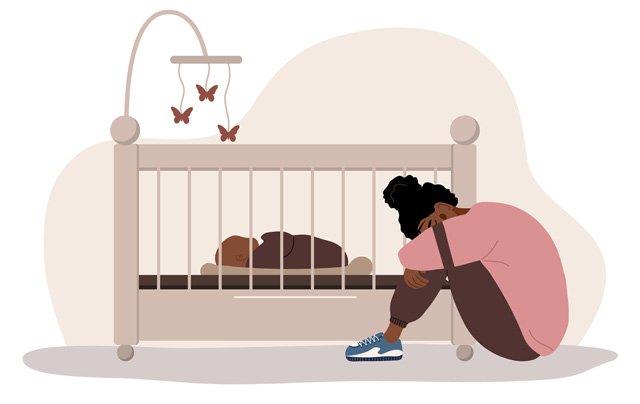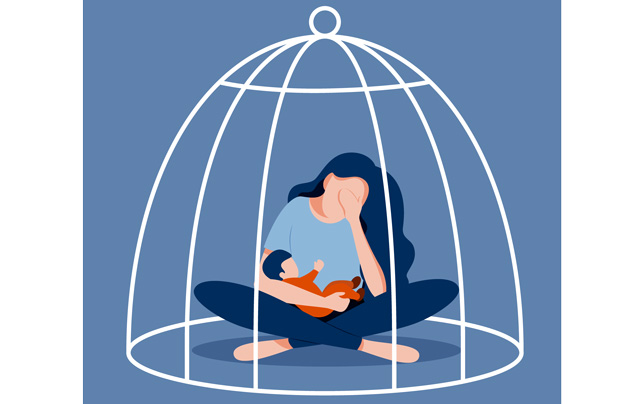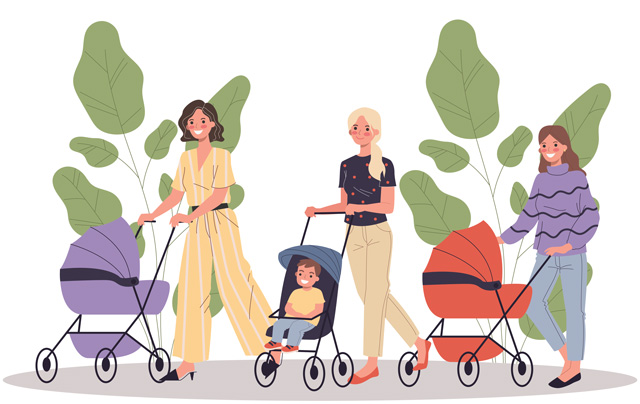What is postnatal depression and what treatment is available?
Everything you need to know about spotting whether you have postnatal depression


Postnatal depression can happen to any new mum, regardless of whether they have suffered from depression in the past. While it can be a frightening experience, there is help and support available.
Every mother goes through matrescence - the process of becoming a mother - and it has a profound impact on who they are as a person, if women were more aware of it then perhaps it might make talking about how hard being a new mum is, a bit easier.
Whether plus size and pregnant or straight sized and pregnant, pregnancy and childbirth causes significant lifestyle changes (like trying to find mum friends), fluctuating hormones and a lack of sleep both while pregnant and after the birth of a child can negatively affect mood. Even if you've never suffered from depression you can develop it while you're pregnant – this is called prenatal depression. If you find yourself depressed after having a baby this is known as postnatal depression (or sometimes postpartum depression).
"Postnatal depression (PND) is a common experience affecting more than 1 in every 10 women within a year of giving birth," explains Stephen Buckley, Head of Information at mental health charity Mind. "Everyone will experience PND differently – and for different lengths of time."
In this article we look at postnatal depression, what signs to look out for and the best and quickest way to get treatment.
What is postnatal depression?
A type of depression, postnatal depression occurs within the first year of a woman giving birth. While PND is a mental health condition, it often has an organic cause. "Postnatal depression is not just a state of mind, but biological too," says Fiona Austin, a psychologist and health coach for wellbeing platform Mamma. "It's normal, it's biological, it's a gargantuan shift in our identity," she says. What PND isn't is the so-called 'baby blues' – temporary low mood and tearfulness that occurs a few days after childbirth and disappears within a couple of weeks. Postnatal depression goes on for longer than this and can be very debilitating.
It often comes as shock for women to realise that they're struggling with postnatal depression and they may feel ashamed to admit it. "PND is hugely common but often hidden – both consciously and unconsciously – by our survival mechanism to cope with the new baby," says Fiona. "I’ve had so many clients that have said 'I realise now I was hugely depressed… but just got on with things'. This can be the worst as you just don’t even know yourself what’s wrong."
Parenting advice, hot topics, best buys and family finance tips delivered straight to your inbox.
These days, there's a lot more awareness and understanding surrounding postnatal depression than in previous decades, so sufferers don't have to battle through it alone or fear that their baby will be taken away if they admit to it.

Postnatal depression symptoms
- Persistent low mood, sadness, or depression
- Irritability
- Anxiety
- Feelings of helplessness
- Loss of enjoyment of life
- Tearfulness
- Lack of energy/tiredness
- Trouble sleeping
- Appetite changes
- Withdrawing from friends and family
- Difficulty bonding with your baby
- Frightening thoughts that you might want to hurt yourself or your baby.
Feeling low, irritable, sad or helpless, feeling tired, sleeplessness, and experiencing a lack of enjoyment in your life or your baby are some of the signs of postnatal depression. Anxiety is also a symptom. Yet many of us might think this is a normal response to parenthood and so ignore our feelings of helplessness and depression.
"A new baby in the home can naturally bring about stress and anxiety as we strive to be the best parent possible," says Louise Broadbridge, aka The Honest Midwife and a speaker at The Baby Show at the NEC in Birmingham. "As a result, changes in behaviour can often be brushed aside as just part and parcel of parenthood."
Fiona warns that postnatal depression can also include anxiety. "Often they come hand-in-hand. But the latter can be left in the dark when supporting someone out of this debilitating and disconnected emotion," she says. "They both need to be addressed." Here are the signs of anxiety to watch out for.
If you're suffering from one or more of the above symptoms for more than two weeks in the year after giving birth, you could have postnatal depression.
Possible triggers of postnatal depression
- Previous experiences of mental health problems, including a mental health problem when you're pregnant
- Lack of support during pregnancy and after birth
- Experiences of abuse
- Difficult childhood experiences, such as neglect
- Being in a situation where you felt pressured to have a baby, or not feeling like it was the right choice for you
- Stressful living conditions, such as poor housing or money problems.
While postnatal depression can affect anyone some women are more vulnerable than others. This is usually a result of past mental health conditions or lifestyle factors. “There are a lot of reasons why someone might develop PND or other perinatal mental health problems," explains Stephen Buckley, a spokesperson for Mind. "A combination of factors is likely to be behind most experiences of PND and you might find you're more likely to get PND if you relate to a lot of these factors. But you could still get PND even if only one factor feels relatable or none at all," he says.
Even if none of these factors apply to you, don't feel like you can't ask for help. Sometimes, there are no obvious reasons for developing postnatal depression.
Edinburgh Postnatal Depression Scale
If you speak to a health professional, such as your GP or health visitor, to discuss how you are feeling they may ask you to complete the Edinburgh Postnatal Depression Scale (EPDS). This is a series of questions to identify PND and measure the severity of your symptoms. NICE guidelines recommend that this test is taken to determine how depressed you are and what sort of treatment you should be offered.
You can also take the Edinburgh Postnatal Depression Scale test online. However, it's not advisable to self-diagnose so always speak to your GP or health visitor about your results.
https://youtu.be/w0aaM9XzwTA
How long does postnatal depression last?
Postnatal depression usually lasts between a couple of weeks up until a year after giving birth. Sometimes, symptoms carry on for longer, especially if the condition is left untreated. How long postnatal depression lasts depends on the person, their circumstances and whether they've had any help or support. "PND is hormones and circumstance dependent," says psychologist Fiona Austin. "We're not meant to have children in isolation so one area that contributes greatly to reducing this new time is talking with other mums or a therapist," she advises.
While The Royal College of Psychiatrists reports that most women will get better without treatment after 3-4 months, it's believed that 1 in 4 mums will still be depressed by their child's first birthday. With this in mind, even if you think you'll get better on your own it won't do any harm to seek support sooner rather than later, in order to avoid PND lingering on.
Treatments for postnatal depression
Fortunately, there are a variety of treatments for postnatal depression. These include talking therapies such as psychotherapy, counselling and cognitive behavioural therapy (CBT), medication and support groups. Hormone therapy may also ease your symptoms. For example, pregnancy can affect the thyroid and hypothyroidism (an underactive thyroid) can impact mental health. So can that most precious of activities – sleep (particularly deep sleep). "This is the biggest sleep disruptor we’ll encounter in our lives," says Fiona. "Get sleep where you can. Sleep is a must."
Your first port of call should be your GP or health visitor. "A visit to your GP is important, just to chat about how you are feeling," says Louise. "This doesn't always result in a prescription but may open up opportunities for talking therapies or local groups who can offer support."
Don't worry that you'll be put on medication such as anti-depressants against your will. Depending on how bad your depression is your doctor will advise you but won't insist. If you're not sure about taking anti-depressants, Fiona suggests asking for a hormone, vitamin and mineral check-up first. "Sometimes it’s as simple as a hormone blast or a mineral deficiency post-pregnancy," she says. While this is true, if your tests come back normal and you're struggling there's no shame in taking medication to see you through this challenging period. If you're breastfeeding your baby certain anti-depressants are regarded as safe; however, if you're still unsure you can ask for alternatives or consider bottle-feeding.
Support for postnatal depression
Getting support is key to coping with postnatal depression, so don't be afraid to reach out to your GP, health visitor, partner, family or friends. A charity such as the PND Awareness and Support Charity PaNDAS or a mental health organisation such as Mind can also provide advice.
"If possible, try to build a good support system, stay healthy, take time to relax. And seek support for your mental health when you need it," says Mind spokesperson Stephen Buckley, though he admits these things aren't always easy or possible to do.
While mum groups can be hugely supportive some may also, at times, be a bit competitive or other mums may not admit they're suffering too. "Sometimes mum groups can make it worse if there’s no vulnerability and honesty in the group," says psychologist Fiona Austin. "Pretending and competing that everyone is doing well when they’re not can make a bad situation worse."
If you suspect this about a group you're part of, Fiona recommends joining a group specifically set up for women with PND. "Groups with a counsellor or therapist present can be great as the mums can share and perhaps not get away with pretending everything is alright," she says. "These groups can also be great fun!" Your health visitor or GP surgery should have details of such groups. PaNDAS is also a great resource – the charity has a free helpline and can point you in the right direction for social media and Facebook groups and face-to-face groups in your area.

Can you reduce the risk of postnatal depression?
You may not be able to avoid postnatal depression, but there are ways to reduce the risk or manage symptoms. As well as being aware of the triggers, a good support system, therapy or a support group, and medication can help, as can self-help techniques. "Although there's no failsafe way of preventing postnatal depression there are things that you and your partner can do to minimise the risk or help yourself whilst suffering," says midwife Louise Broadbridge. "If starting a family is something you're considering, try to get as fit and healthy as possible. Our physical and mental wellbeing are very much connected. Starting your pregnancy in tip-top condition can help throughout and beyond," she says, as can exercising during your pregnancy.
As mentioned previously, some women who face certain challenges are more prone to postnatal depression. Triggers include mental health conditions, a history of trauma or abuse, a lack of support, or financial worries such as the rising cost of energy bills. "It's helpful to understand if you are at a higher risk of developing postnatal depression," continues Louise. "If you or women in your family have a history of depression following childbirth this does increase your risk."
Your medical history should be picked up in your antenatal appointments, which is an important reason not to miss any. "Your midwife will ask you about this history so appropriate support is arranged for you," says Louise. "It's also a good idea for you and your family to chat about the possibility of postnatal depression, the signs, and where you can go for support if needed. Writing these plans down before you need them may help you to seek help sooner if you can revisit your thoughts at a time when you may not be thinking as clearly," she advises.

Delegation and self-care
Fiona recommends delegating tasks if possible or at least sharing the emotional load so you don't become too tired or overwhelmed. "Don’t do everything yourself. Let your husband, mum or mum-in-law help. Let other members of family and friends help," she says. "If you don’t have family and friends join a group. Get therapy but don't try to cope alone."
Self-help techniques can can be effective at managing symptoms. This can be something as simple as taking time out to have a bath every evening (preferably with a 'Do not disturb' sign on the door!) or trying some natural remedies for anxiety. Or try postnatal yoga, postnatal exercise or self-visualisation techniques. "Why not revisit all the lovely hypnobirthing practice you may have done during pregnancy," suggests Louise. "Use these relaxation and visualisation skills in any situation to help keep things in check. Mindfulness is ever more popular and, again, can help to quieten the mind and encourage relaxation," she says.
The most important thing to remember throughout is that PND is common. It's not something to be ashamed of or to hide, says Louise, reassuringly. "Make sure you talk to those who love and care for you. Communicating how you feel is the first step to feeling better."
Video of the Week

Debra Waters is an experienced online editor and parenting writer. She also has a strong background on health, wellbeing, beauty, and food. She currently writes for Goodto and Woman&Home, and print publications Woman, Woman’s Own, and Woman’s Weekly. Debra has written for What to Expect, Everyday Health, and Time Out. In addition, she has had articles published in The Telegraph and The Big Issue.